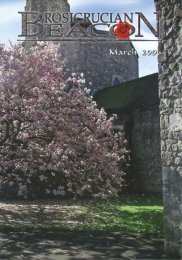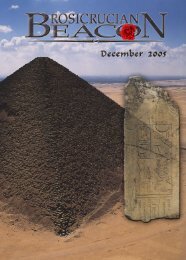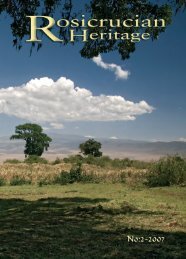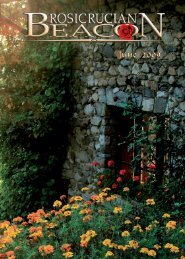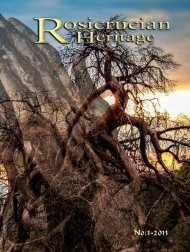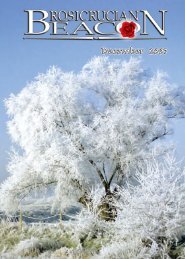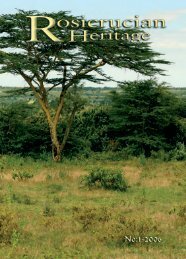Rosicrucian Beacon Magazine - 2013-03 - AMORC
Rosicrucian Beacon Magazine - 2013-03 - AMORC
Rosicrucian Beacon Magazine - 2013-03 - AMORC
You also want an ePaper? Increase the reach of your titles
YUMPU automatically turns print PDFs into web optimized ePapers that Google loves.
lived on dandelion roots instead of their customary bread.<br />
Still, as a nourishing food, in many countries it has for<br />
centuries been wisely employed as a food source.<br />
Both wild and cultivated varieties are used. The<br />
young, tender leaves, abounding in vitamins and minerals,<br />
are excellent for making delicious green salads. Often they<br />
are cooked like spinach and served with butter or vinegar;<br />
mixed with other greens they are less bitter-tasting. Also,<br />
finely chopped dandelion leaves can be used in sandwiches.<br />
Here are some reasons why it might pay us nutrition-wise<br />
to include dandelion in our daily intake of food:<br />
In an experiment for the U.S. Department of<br />
Agriculture, H. B. Stiebling discovered that, of those<br />
plants tested, the least iron was found<br />
in melons and apples. Dandelion,<br />
watercress and spinach contained the<br />
most. Iron helps fight that “tired feeling”<br />
in our bodies, as well as the sensation<br />
of breathlessness. It is an all-important<br />
factor in the manufacture of red blood<br />
cells which carry oxygen to vitalise tissue<br />
and help carry off waste carbon dioxide.<br />
According to doctors, iron<br />
deficiency is a major health problem throughout the<br />
world. In the United States alone, for example, it is<br />
estimated that between 10 and 25 percent of people<br />
admitted into hospitals have insufficient amounts of this<br />
vital, and vitalising, mineral. In countries where food is<br />
less abundant the percentages would be higher.<br />
Simple anaemia is the medical term meaning<br />
inadequate amounts of iron in the body-system.<br />
Established cases should always be given medical<br />
treatment, of course. When we eat dandelion for<br />
a source of required iron, however, we are taking<br />
a definite step toward preventing the debilitating<br />
symptoms of anaemia. We are also enabling our bodies<br />
to make use of the wonderful energies we associate with<br />
oxygen, energies that keep us healthy, vibrant and active.<br />
Iron is also directly related to the proper functioning<br />
of plant chlorophyll which, in conjunction with light,<br />
manufactures the plant’s food supply. When a plant is<br />
deprived of adequate iron, its leaves turn abnormally<br />
yellow and its value as human food degenerates. It is<br />
logical, therefore, to believe that when iron content is<br />
high, as in the dandelion, there will be a superabundance<br />
of plant food that will become human nourishment when<br />
assimilated.<br />
Another reason for the excessive vitamin and mineral<br />
content of dandelion may be its long, tapering taproot<br />
which often penetrates deeply into the earth. Experiments<br />
indicate that some plants absorb minerals from different<br />
soil levels. The peanut, for example, absorbs calcium near<br />
the surface; other minerals are taken in at deeper points.<br />
The dandelion’s long taproot naturally gives it access to<br />
more elements and may very well enhance its absorption<br />
of them, especially those that can be obtained best from<br />
deeper levels.<br />
The root itself is a unique form of food. Sliced, it is a<br />
tasty contribution to salad. It is also used to flavour soups<br />
and stews and to make broth. When fried like parsnips<br />
the roots should be young and succulent and gathered<br />
preferably in winter when their ordinarily bitter sap<br />
becomes thick and sweet. Other uses for the root include<br />
the making of a health drink and as an adulterant for<br />
coffee. For these purposes, the root is dried, ground and<br />
usually roasted. It affects the flavour of<br />
coffee much in the same way as chicory.<br />
There are numerous reasons for<br />
the belief that dandelion roots are<br />
uncommonly nourishing to humans.<br />
For one thing, they are the storehouse<br />
for energy that enables the dandelion to<br />
make its early appearance each spring.<br />
This energy-material is manufactured<br />
during one growing season, saved<br />
throughout the winter, and then used the following<br />
spring for early flower-production. For this reason, it<br />
is generally believed that dandelion roots are a doublecharged<br />
source of human nutrition. Greek Mythology<br />
relates that Theseus, who had energy and strength to slay<br />
both the bull of Marathon and the monstrous Minotaur,<br />
was fed this food by Hecate, the moon-goddess.<br />
Iron helps fight that ‘tired feeling’ in our bodies,<br />
as well as the sensation of breathlessness.<br />
Called by some modern scientists “a weird substance”<br />
this food is neither starch nor sugar. In many respects it<br />
is like both; for, although it possesses characteristics of<br />
starch, it is still soluble like sugar. It is readily transformed<br />
into fructose, a form of sugar. Actually, every part of the<br />
dandelion plant can be eaten for food and is considered<br />
a tonic as well as nutritious. Even the flowers are used to<br />
make wine, or they may be added to any salad to beautify<br />
and increase food value.<br />
Medicinal Qualities<br />
Dandelion is also used in medicine as (1) a means to<br />
increase the secretion and discharge of urine from the<br />
body, (2) a strengthener of the stomach, (3) a promoter of<br />
the discharge of bile from the system. It is excellent for the<br />
prevention and cure of scurvy which is caused essentially<br />
38<br />
The <strong>Rosicrucian</strong> <strong>Beacon</strong> -- March <strong>2013</strong>


